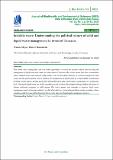Invisible waste: Understanding the political culture of solid and liquid waste management in towns of Tanzania
| dc.contributor.author | Moyo, Francis | |
| dc.contributor.author | Komakech, Hans | |
| dc.date.accessioned | 2023-03-22T11:49:23Z | |
| dc.date.available | 2023-03-22T11:49:23Z | |
| dc.date.issued | 2022-01-12 | |
| dc.identifier.uri | https://dspace.nm-aist.ac.tz/handle/20.500.12479/1840 | |
| dc.description | This research article was published INNSPUB in 2022 | en_US |
| dc.description.abstract | This article uses ethnographic and case study approaches to unveil the distinct culture characterising the management of liquid and solid waste in urban areas of Tanzania. The article shows that slow accumulation nature of liquid waste such as faecal sludge makes it of less immediate nuisance to residents compared to solid waste, and the general public tend to perceive the management of liquid waste as a responsibility of individual dwelling owners hence a private good rather than public good that would require organisation at a community level. This makes liquid waste less visible to politicians and residents alike despite it being a higher risk factor for disease outbreaks compared to solid wastes. The article argues that attempts to improve liquid waste management need to focus on making it a political priority by creating demand driven service provision, where residents would increase political pressure for access to improved liquid waste management services. | en_US |
| dc.language.iso | en | en_US |
| dc.publisher | INNSPUB | en_US |
| dc.subject | Solid waste | en_US |
| dc.subject | Liquid waste | en_US |
| dc.subject | Management | en_US |
| dc.title | Invisible waste: Understanding the political culture of solid and liquid waste management in towns of Tanzania | en_US |
| dc.type | Article | en_US |

